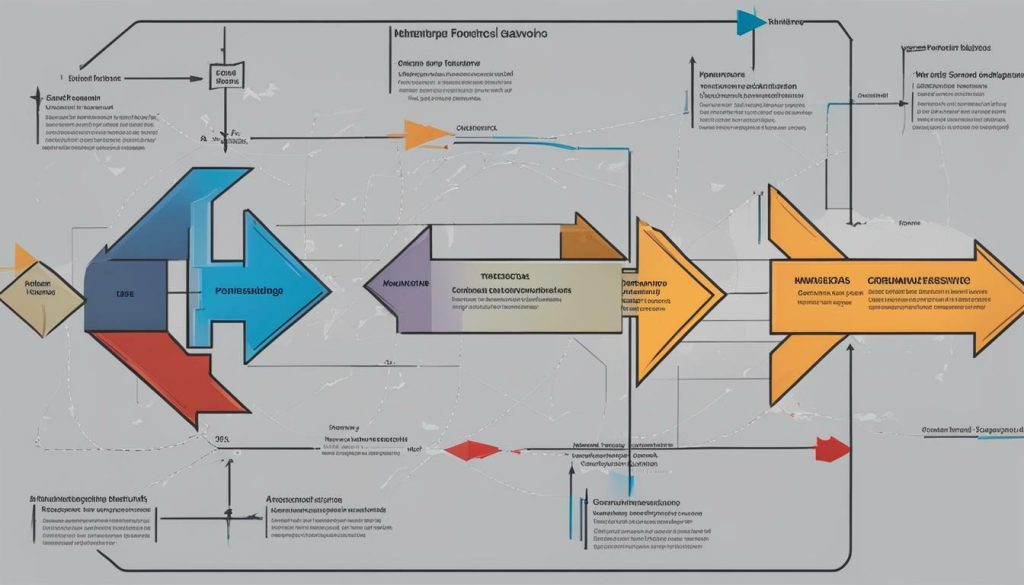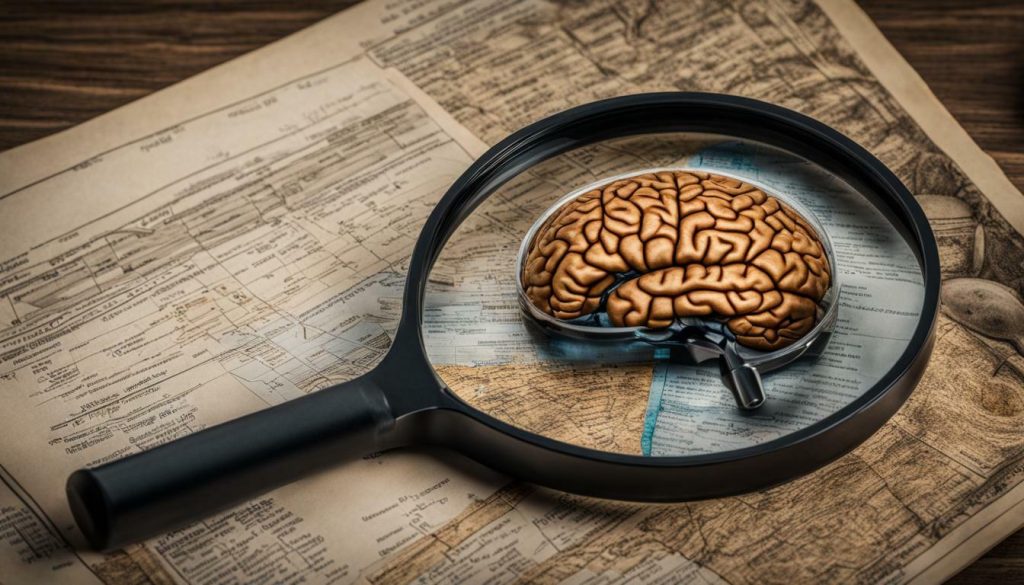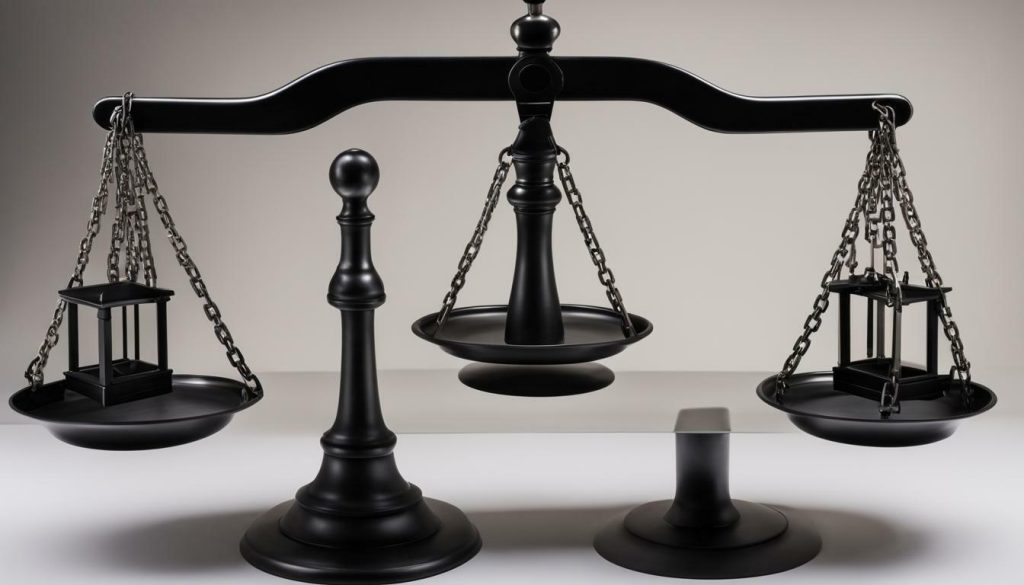
Welcome to my course on forensic psychology skill development, where we will unlock the secrets of the criminal mind. Forensic psychology is a fascinating field that combines psychology with the legal system to understand and analyze criminal behavior. By developing essential skills in this area, you can open doors to a diverse range of career opportunities.
Forensic psychology practitioners possess a unique set of traits that enable them to navigate the complexities of criminal justice. Strong communication skills, objectivity, critical thinking, attention to detail, and compassion are fundamental in this field. These skills allow forensic psychologists to gather accurate information, assess the psychological state of individuals involved in legal proceedings, and provide expert insight to aid in investigations and court cases.
Careers in forensic psychology are both rewarding and challenging. As a forensic psychologist, you may work as a corrections counselor, helping incarcerated individuals reintegrate into society, or as a victim advocate, providing support and resources to those affected by crime. You could also serve as a jury advisor, assisting legal teams in selecting fair and impartial jurors. Other roles include licensed professional clinical counselors, correctional counselors, jail supervisors, federal government employees, police consultants, probation officers, and more.
Forensic psychologists apply their skills in various settings, including correctional facilities, courtrooms, government organizations, and research institutions. This diverse range of environments allows forensic psychology practitioners to contribute to the justice system and make a meaningful impact on society.
Starting a career in forensic psychology requires the necessary education and training. Typically, individuals pursue a Ph.D. or Psy.D. in forensic psychology, which involves coursework, research, and supervised practical experience. Licensure is also a requirement in most states. A bachelor’s degree in psychology can serve as a solid foundation for further studies and career opportunities in the field.
Unlocking the secrets of the criminal mind through forensic psychology skill development is a fascinating journey. By understanding the motivations and thought processes of criminals, forensic psychologists assist in solving cases and providing insights that aid legal proceedings. This vital link between psychology and the legal system is instrumental in achieving justice for all.
- Forensic psychology combines psychology with the legal system to understand criminal behavior.
- Strong communication skills, objectivity, critical thinking, attention to detail, and compassion are essential traits for forensic psychology practitioners.
- Career opportunities in forensic psychology include roles such as corrections counselors, victim advocates, and jury advisors.
- Forensic psychologists apply their skills in various settings, including correctional facilities, courtrooms, and government organizations.
- Education and training requirements for forensic psychologists typically involve a Ph.D. or Psy.D., supervised professional experience, and licensure.
The Importance of Forensic Psychology Skills
Forensic psychology integrates psychology with the legal system and demands a range of skills such as strong communication, critical thinking, and compassion. These skills are essential for forensic psychology practitioners who work in various roles within the criminal justice system.
Effective communication is crucial for forensic psychologists as they interact with diverse individuals, including law enforcement officials, attorneys, and individuals involved in criminal cases. Through clear and concise communication, forensic psychologists can convey complex psychological concepts and findings to non-experts in a way that is easily understood.
Critical thinking is another vital skill for forensic psychologists. They must analyze and interpret a wide range of information, including crime scene evidence, witness testimonies, and psychological assessments, to form accurate conclusions and provide expert opinions. This skill allows them to identify patterns, detect inconsistencies, and develop insights into the motivations and behaviors of individuals involved in criminal cases.
Compassion is a crucial aspect of forensic psychology, as practitioners often work with individuals who have experienced trauma or are involved in challenging legal situations. Forensic psychologists must demonstrate empathy and understanding while maintaining objectivity and professionalism. This combination of compassion and objectivity allows them to provide support and guidance to victims, defendants, and other parties involved in the criminal justice system.

In summary, the skills required in forensic psychology are diverse and essential for practitioners working in the field. Strong communication skills enable them to effectively convey complex information, critical thinking skills allow for accurate analysis and interpretation of evidence, and compassion ensures ethical and empathetic interactions with individuals involved in criminal cases. These skills, along with others such as attention to detail and objectivity, form the foundation of a successful career in forensic psychology.
Career Opportunities in Forensic Psychology
Forensic psychology offers a multitude of career paths, including roles as licensed professional clinical counselors, correctional counselors, and victim advocates. Forensic psychologists play a crucial role in the legal system, applying their expertise in understanding behavior and mental processes to assist with investigations, court proceedings, and rehabilitation programs. With their unique skill set, forensic psychology practitioners have the opportunity to make a significant impact on the lives of individuals involved in the criminal justice system.
One common career path in forensic psychology is working as a licensed professional clinical counselor. These professionals provide therapy and counseling services to individuals who have experienced trauma or are struggling with mental health issues. They may work in correctional facilities, rehabilitation centers, or private practice settings. By helping individuals overcome their challenges, licensed professional clinical counselors contribute to reducing recidivism rates and promoting positive change.
Another career option is becoming a correctional counselor. In this role, forensic psychology practitioners work directly with individuals who are incarcerated or on probation. They assess their needs, develop treatment plans, and provide counseling services to promote rehabilitation and reduce reoffending. Correctional counselors also play a critical role in addressing mental health issues and helping inmates reintegrate into society successfully.
Victim advocacy is an essential aspect of forensic psychology as well. Victim advocates provide support, resources, and assistance to individuals who have been affected by crime. They ensure that the voices and rights of victims are heard and respected throughout the legal process. Victim advocates may work with law enforcement agencies, non-profit organizations, or government entities, helping survivors navigate the complex judicial system and access necessary services and support.
| Career Opportunities in Forensic Psychology: | Roles |
|---|---|
| 1 | Licensed Professional Clinical Counselors |
| 2 | Correctional Counselors |
| 3 | Victim Advocates |
These are just a few examples of the many career opportunities available to forensic psychology practitioners. Whether it’s providing therapy, counseling, or support to individuals in need, forensic psychologists have the chance to contribute to the justice system and make a positive impact on society as a whole.

Forensic psychologists apply their skills in a variety of settings, including correctional facilities, courtrooms, and research institutions. These settings provide unique opportunities for forensic psychologists to contribute to the legal system and make a difference in the lives of individuals involved in criminal justice.
In correctional facilities, forensic psychologists work closely with inmates to assess and treat mental health issues, develop rehabilitation programs, and provide counseling and support. They play a critical role in helping offenders reintegrate into society and reduce the risk of recidivism.
In courtrooms, forensic psychologists serve as expert witnesses, helping to inform judges and juries about the psychological aspects of a case. They provide insights into the mental state of defendants, evaluate their competency to stand trial, and offer expert opinions on issues such as eyewitness testimony, jury selection, and the impact of trauma on victims.
Research institutions also provide a key setting for forensic psychologists to contribute to the field. Here, they conduct studies, analyze data, and collaborate with other professionals to advance our understanding of the criminal mind and improve forensic assessment and intervention techniques.
| Setting | Description |
|---|---|
| Correctional Facilities | Working with inmates to assess mental health, develop rehabilitation programs, and provide counseling. |
| Courtrooms | Serving as expert witnesses, evaluating competency and providing insights into psychological aspects of a case. |
| Research Institutions | Conducting studies, analyzing data, and collaborating to advance understanding of the criminal mind. |
From helping individuals in correctional settings to informing legal proceedings in courtrooms and conducting groundbreaking research, forensic psychologists make valuable contributions across various application settings. Their expertise and skills are essential in promoting justice, improving mental health outcomes, and ensuring a fair and equitable legal system.

To become a forensic psychologist, a Ph.D. or Psy.D. in forensic psychology, along with supervised professional experience and licensure, is typically required. This advanced level of education and training is essential in developing the necessary expertise to handle the complexities of the field.
Forensic psychology education programs provide specialized coursework that explores the intersection of psychology and the legal system. Students gain a deep understanding of criminal behavior, the psychological factors that influence it, and the various assessment and treatment methods used in forensic settings.
Supervised professional experience is crucial for aspiring forensic psychologists. It allows them to apply their knowledge in real-life situations, working under the guidance of experienced professionals. This hands-on experience helps develop the practical skills needed to address complex legal cases and navigate the challenges of the criminal justice system.
Obtaining licensure is an important step for forensic psychologists. Licensure requirements vary by state, but usually involve completing a specified number of supervised clinical hours, passing a licensing exam, and maintaining continuing education credits. Licensure ensures that practitioners meet the highest standards of professionalism and ethical conduct.
| Required Education | Supervised Experience | Licensure |
|---|---|---|
| Ph.D. or Psy.D. in forensic psychology | Hands-on experience under the guidance of experienced professionals | Completion of specified clinical hours, passing a licensing exam, and continuing education |
Overall, the path to becoming a forensic psychologist requires dedication, perseverance, and a strong passion for both psychology and the legal system. By following the necessary educational and training requirements, individuals can acquire the knowledge and skills needed to make a meaningful impact in this fascinating and challenging field.

Unraveling the Criminal Mind through Forensic Psychology Skill Development
Through forensic psychology skill development, practitioners gain the tools to unravel the complexities of the criminal mind and effectively analyze behavior. This field combines the principles of psychology with the legal system, allowing professionals to delve deep into the motivations and thought processes of criminals.
Forensic psychologists employ a variety of techniques to understand criminal behavior. They conduct psychological evaluations, assess risk factors, and analyze patterns to provide valuable insights in investigations and legal proceedings. With their expertise, they can assist law enforcement agencies, courts, and correctional facilities in matters such as criminal profiling, witness assessment, and jury selection.
One crucial aspect of forensic psychology skill development is the ability to remain objective and impartial. Forensic psychologists must separate personal biases and opinions from their work in order to provide accurate and unbiased assessments. Additionally, strong communication skills are essential when collaborating with legal professionals, presenting findings, and testifying in court.
| Key Skills for Forensic Psychology Practitioners |
|---|
| Strong communication skills |
| Objectivity |
| Critical thinking |
| Attention to detail |
| Compassion |
“Forensic psychology skill development equips professionals with the tools to navigate the intricate workings of the criminal mind, contributing to better understanding, prevention, and resolution of criminal behavior.”
Forensic psychology skill development opens up a wide range of career opportunities. From working in correctional facilities as counselors to assisting victims of crime as advocates, professionals in this field play a crucial role in the legal system. With further specialization, forensic psychologists can also serve as experts in various domains, including forensic assessment, forensic therapy, and forensic consultation.

Becoming a forensic psychologist typically requires extensive education and training. Most practitioners hold a Ph.D. or Psy.D. in forensic psychology, along with supervised professional experience and licensure. However, a bachelor’s degree in psychology can serve as a foundation for individuals interested in pursuing this rewarding career path.
Forensic Psychology Skill Development: Unleashing the Power of the Mind
Forensic psychology skill development is a journey that unlocks the potential of the human mind to understand and combat crime. By honing their expertise in analyzing behavior, forensic psychologists contribute to solving complex cases, protecting society, and ensuring justice for all.
The Link between Psychology and the Legal System
Forensic psychology serves as the vital link between psychology and the legal system, facilitating the application of psychological principles in legal contexts. By merging these fields, forensic psychologists play a crucial role in understanding human behavior, motivations, and thought processes within the legal framework.
Within the legal system, psychology provides valuable insights and perspectives that aid in investigations, trial proceedings, and the overall pursuit of justice. Forensic psychologists are skilled at conducting evaluations, assessments, and analyses to assist in determining the mental state, competency, and credibility of individuals involved in legal cases.
In addition to their expertise in psychology, forensic psychologists possess a deep understanding of the legal process and the intricacies of the justice system. This enables them to effectively communicate psychological concepts to judges, attorneys, and jurors in a manner that is both accurate and accessible.
Overall, the integration of psychology into the legal system through forensic psychology enhances the fairness and reliability of legal proceedings. It ensures that important psychological factors are considered when making decisions that can significantly impact individuals’ lives and society as a whole.

Table: Key Contributions of Forensic Psychology to the Legal System
| Contribution | Description |
|---|---|
| Evaluating Competency | Assessing an individual’s ability to understand legal proceedings and participate in their defense. |
| Criminal Profiling | Using psychological analysis to create profiles of offenders, aiding in investigations. |
| Witness Testimony | Evaluating eyewitness memory and credibility to determine the reliability of their testimony. |
| Rehabilitation | Developing treatment plans and interventions to reduce recidivism and promote positive change among offenders. |
| Legal Consultation | Providing expert advice and opinions on psychological issues relevant to legal cases. |
Start Your Journey in Forensic Psychology Skill Development
Are you ready to dive into the exciting world of forensic psychology skill development? Take the first step towards a fulfilling career in understanding the criminal mind. Forensic psychology is a field that integrates psychology with the legal system, offering a wide range of career opportunities.
To succeed in this field, strong communication skills, objectivity, critical thinking, attention to detail, and compassion are fundamental traits for forensic psychology practitioners. As a forensic psychologist, you could find yourself in various roles such as corrections counselors, victim advocates, jury advisors, therapists, and consultants.
There are several career paths available for aspiring forensic psychologists. You can work as a licensed professional clinical counselor, correctional counselor, jail supervisor, victim advocate, jury consultant, federal government employee, police consultant, or probation officer. These professionals apply their skills in different settings including correctional facilities, courtrooms, government organizations, and research institutions.
Education and training are crucial in this field. To become a forensic psychologist, you will typically need to earn a Ph.D. or Psy.D. in forensic psychology and gain supervised professional experience. Licensure is also an important requirement. If you have a bachelor’s degree in psychology, it can serve as the foundation for your journey towards a career in forensic psychology.
FAQ
What is forensic psychology?
Forensic psychology is a field that integrates psychology with the legal system, combining the principles of psychology with law enforcement and the justice system.
What skills are required for a career in forensic psychology?
Strong communication skills, objectivity, critical thinking, attention to detail, and compassion are fundamental traits for forensic psychology practitioners.
What are the career opportunities in forensic psychology?
Careers in forensic psychology can involve roles such as corrections counselors, victim advocates, jury advisors, therapists, and consultants.
Where do forensic psychologists work?
Forensic psychologists can work in various settings including correctional facilities, courtrooms, government organizations, and research institutions.
What education and training is required to become a forensic psychologist?
To become a forensic psychologist, a Ph.D. or Psy.D. in forensic psychology, along with supervised professional experience and licensure, is typically required.
How can I start my journey in forensic psychology skill development?
To start your journey in forensic psychology skill development, you can begin by earning a bachelor’s degree in psychology as a foundation. Further education and specialized training in forensic psychology can then be pursued.



